Image
|
What is it About?
|
Where to Find It?
|
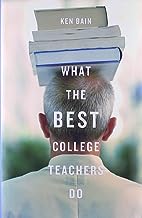 |
What the Best College Teachers Do by Ken Bain (First Edition, 2004)
- profiles examples of educators who had achieved remarkable success in helping students learn in ways that made a sustained, substantial and positive influence on how those students think, act and felt
- based on a 15-year study of 60-70 teachers – looking at the practices and the thinking of the best teachers not the actual classroom performance
- key points: it is not what teachers do, it is what they understand (engage students, value human learning, provoke response)
- all great teachers believe two things: teaching matters and students can learn
|
|
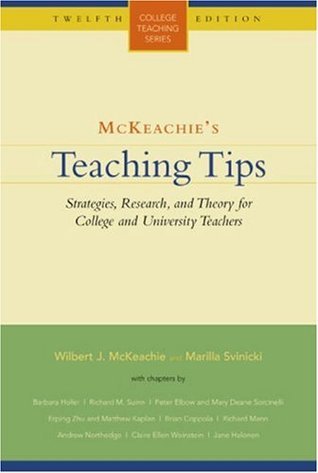 |
McKeachie’s Teaching Tips: Strategies, Research And Theory for College And University Teachers by Wilbert James McKeachie (2005)
- handbook of helpful strategies for dealing with both the everyday problems of teaching at the university level, and those that pop up in trying to maximize learning for every student
- suggested strategies are supported by research and are grounded in enough theory to enable teachers to adapt them to their own situations
- does not suggest a “set of recipes” to be followed mechanically, but gives teachers the tools they need to deal with the ever changing dynamics of teaching and learning.
|
|
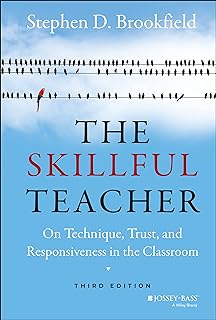 |
The Skillful Teacher: On Technique, Trust, and Responsiveness in the Classroom by Stephen D. Brookfield (3rd Edition, 2015)
- a classic foundational read about what makes for a skillful teacher
- both inspiring but also practical advice for new and experienced teachers
- he uncovers what students most valued in their teachers and explains how one can develop and demonstrate the credibility and authenticity to fill that role
- chapters on critical thinking, creativity, helping students take responsibility for learning, racism and exercising teacher power responsibly
|
|
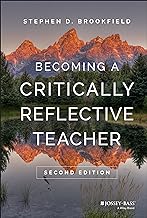 |
Becoming a Critically Reflective Teacher by Stephen Brookfield (2nd Edition, 2017)
- key guide to critical reflection with practical tools to constructively self-critique for any educator at any level
- the book helps you uncover and assess your assumptions and then view them through your students’ eyes, your colleagues’ perceptions and relevant theory and research
- easy to follow and explore in context of your own practice
|
|
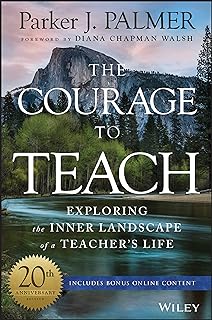 |
The Courage to Teach: Exploring the Inner Landscape of a Teacher’s Life by Parker Palmer (20th Anniversary Edition – 2017)
- a classic must-read
- this book is for teachers who have good days and bad days, refuse to harden their hearts because they love learners, learning and the teaching life
- builds on the simple premise that good teaching cannot be reduced to technique but is rooted in the identity and integrity of the teacher – they are authentically present in the classroom, deeply connected with their students and their subject/discipline area
- these connections are in the teacher’s heart
|
|
 |
Creating Significant Learning Experiences: An Integrated Approach to Designing College Courses by L. Dee Fink
- provides a step-by-step guide to building courses from scratch or redesigning existing course using backwards design
- focuses on different categories of learning outcomes and easily shows you how to build learning experiences
|
|
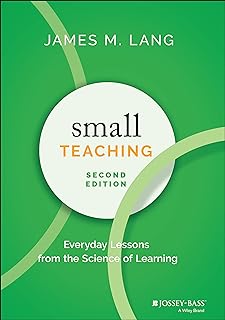 |
Small Teaching: Everyday Lessons from the Science of Learning by James M. Lang (2nd Edition, 2021)
- shares a collection of techniques for instructors to easily implement in classroom
- combines how people learn to those practices that best support student learning
- organized into three parts: Knowledge, Understanding and Inspiration – within each part are practical examples of how to use principles of how learning happens
|
|
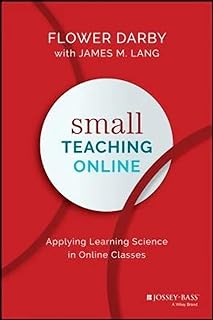 |
Small Teaching Online: Applying Learning Science in Online Classes by Flower Darby with James. M. Lang (2019)
- small and strategic changes have enormous power to improve student learning – small teaching strategies that will positively impact the online classroom
- practical and feasible applications of theoretical principles to help your online students learn
- includes current best practices around educational technologies, strategies to build community and collaboration, and minor changes you can make in your online teaching practice, small but impactful adjustments that result in significant learning gains
|
|
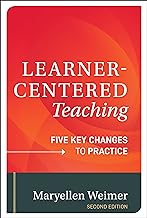 |
Learner Centered Teaching: Five Key Changes to Practice by Maryellen Weimer (2nd Edition – 2013)
- Maryellen Weimer―one of the nation’s most highly regarded authorities on effective college teaching
- for those who are familiar with core pedagogies and practices and wanting to take to next level of reflective practice and renewal
- learner-centered teaching focuses attention on what the student is learning, how the student is learning, the conditions under which the student is learning, whether the student is retaining and applying the learning, and how current learning positions the student for future learning
|
|
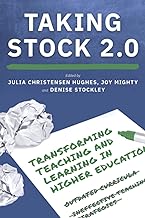 |
Taking Stock 2.0: Transforming Teaching and Learning In Higher Education by Julia Christensen, Joy Mighty and Denise Stockley (Second Edition, 2022)
- challenges everyone who facilitates learning at the post-secondary level – and our institutions – to critically examine how the Canadian post-secondary landscape is changing
- drawing on a broad spectrum of Canadian and international scholarship, contributing authors crystalize key drivers that are disrupting the status quo in Canada’s post-secondary context and identify key areas for development and research over the next decade
|
|
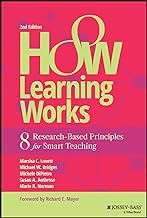 |
How Learning Works: Eight Research-Based Principles for Smart Teaching by Marsha C. Lovett, Michael W. Bridges, Michele DiPeitro, Susan A. Ambrose and Marie K. Norma (2023)
- Readers will find eight essential learning principles that distill the overwhelming research literature into: real-world teaching and learning scenarios, examples that reflect a diverse set of teaching environments and learner population through 150 practical strategies
- based on research from cognitive psychology, developmental psychology, education, anthropology, and more―this book makes learning work for you and your students
|
|
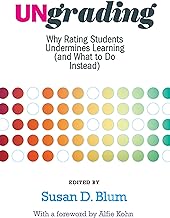 |
Ungrading: Why Rating Students Undermines Learning (and What to Do Next) Edited by Susan D. Blum
- moment is right for critical reflection on what has been assumed to be a core part of school
- fifteen educators write about their diverse experiences going gradeless – some contributors are new to the practice and some have been engaging in it for decades.
- based on rigorous and replicated research, this is the first book to show why and how faculty who wish to focus on learning, rather than sorting or judging, might proceed – includes honest reflection on what makes ungrading challenging, and testimonials about what makes it transformative
|
|
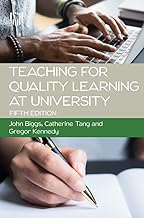 |
Teaching for Quality Learning at University by John Biggs, Catherine Tang and Gregor Kennedy (2022)
- a classic on the topic of teaching, learning and curriculum design in higher education
- focusing on the concept of constructive alignment with student learning outcomes being identified first and then the teacher designs the activities to align with the outcomes
- each chapter outlines how to design the learning outcomes, teaching and assessments for success in learning
- provides a comprehensive, research-based theory of teaching for teacher reflection
|
|
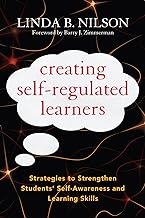 |
Creating Self-Regulated Learners: Strategies to Strength Students’ Self-Awareness and Learning Skills by Linda B. Nilson (2013)
- an easy book to follow with treasure trove of short activities any instructor can embed into an existing course or class to increase students’ awareness of how to learn
- most of our students neither know how learning works nor what they have to do to ensure it, to the detriment both of their studies and their development as lifelong learners
- Nilson provides the theoretical background to student self-regulation,the evidence that it enhances achievement, and the strategies to help students develop it
|
|
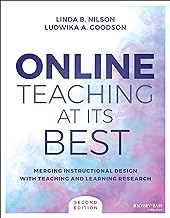 |
Online Teaching at Its Best: Merging Instructional Design with Teaching and Learning Research by Linda B. Nilson and Ludwika A. Goodson (2nd Edition, 2021)
- scholarly resource for online learning that address course design, teaching, and student motivation integrating those with pedagogical and cognitive science and latest research
- practical, real-world advice for online instructors, instructional designers and administrators for remote, hybrid, hyflex and full online learning
|
|
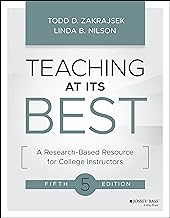 |
Teaching at Its Best: A Research-Based Resource for College Instructors by Todd D. Zakrajsek and Linda B. Nilson (5th Edition, 2023)
- higher education playbook provides a wealth of research-backed practices for nearly every aspect of effective teaching throughout higher education
- filled with practical guidance and proven techniques designed to help you improve student learning, both face-to-face and online
- one of the most comprehensive books on effective teaching and learning
|
|
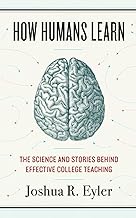 |
How Humans Learn: The Science and Stories Behind Effective College Teaching by Joshua R. Eyler (2018)
- identifies five broad themes running through recent scientific inquiry-curiosity, sociality, emotion, authenticity, and failure-devoting a chapter to each and providing practical takeaways for busy teachers
- Joshua interviews and observes college instructors across the country, placing theoretical insight in dialogue with classroom experience
|
|
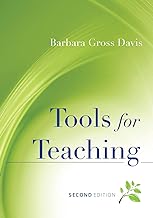 |
Tools for Teaching by Barbara Gross Davis (Second Edition – 2009)
- practical, accessible reference manual for faculty in any discipline
- more than sixty-one chapters designed to improve the teaching of beginning, mid-career, or senior faculty members
- traditional tasks of teaching as well as broader concerns, such as diversity and inclusion in the classroom and technology in educational settings
|
|
 |
Classroom Assessment Techniques: Formative Feedback Tools for College and University Teachers by Thomas A. Angelo and Todd D. Zakrajsek (Third Edition, June 2024)
- completely revised and updated third edition provides a research-based, engaging guide to assessing student learning where it matters most―at course and classroom levels
- field-tested guidance, tools, and advice for planning, designing, and implementing formative assessment in face-to-face, hybrid, and fully online classrooms, analyzing resulting data, and using that data to improve student learning
|
|
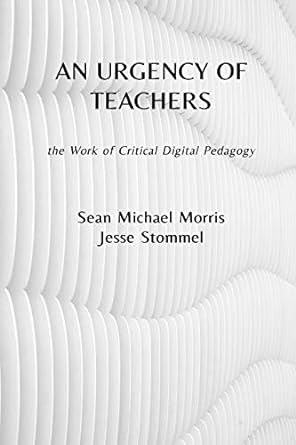 |
An Urgency of Teachers: the Work of Critical Digital Pedagogy by Jesse Stommel and Sean Michael Morris
- collection of essays explores the authors’ work in, inquiry into, and critique of online learning, educational technology, and the trends, techniques, hopes, fears, and possibilities of digital pedagogy
- It is urgent that we have teachers. In a political climate increasingly defined by obstinacy, lack of criticality, and deflection of fact and care; in a society still divided across lines of race, nationality, religion, gender, sexuality, income, ability, and privilege; in a digital culture shaped by algorithms that neither know nor accurately portray truth, teaching has an important (urgent) role to play
|
|




















